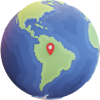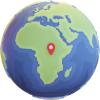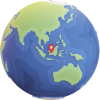Case studies are organised by region, with each region featuring links to the countries where the case studies are located.
Bolivia

Corruption is a significant issue in the Bolivian timber industry, with false or fraudulent documents being issued by government officials. Companies launder illegal timber into supply chains by fraudulently obtaining paperwork, falsifying the Forestry Origin Certificate (CFO), or selling timber without a CFO. Most of this illegal timber comes from protected areas, indigenous territories, or natural forests.
Illegal timber is laundered out of Bolivia by loggers making fraudulent declarations of greater numbers of trees than exist, artificially inflating the number of trees in authorised forest management areas or logging plans. This allows them to supplement their timber consignment with illegally extracted timber from other areas.
René Noel Sivila Céspedes, a former Forest and Land Authority (ABT) official, reportedly signed 2,096 documents authorising the clearing of protected areas between 2015 and 2018. A 2018 report by the ABT found that the agency authorised the cutting of at least two protected species at far higher rates than is permitted by law.
Keywords: Latin America, Bolivia, timber, primary production, corruption and bribery, fraudulent documentation, illegal timber trade
Source: https://www.forest-trends.org/wp-content/uploads/2022/01/Bolivia-Timber-Leaglity-Risk-Dashboard-IDAT-Risk.pdf
Brazil

According to the Organized Crime and Corruption Reporting Project (OCCRP), seven individuals were detained in Pará, Brazil after suspicions of illegal Amazon timber trade. Among those detained is a former employee of the Pará Environmental Secretariat (SEMAS). Investigation began in 2019, with the operation “Dark Wood” involving a total of nine search and seizure warrants and the freezing of bank accounts. The two-year investigation sought to dismantle the criminal scheme that enabled the illegal extraction of sale and timber. The scheme involved laundering wood from illegal deforestation, yielding significant profits. It disguised the origins of illicit wood, which was then exported to the United States. Yellow Ipê wood, highly valued in the U.S., was a primary target. During their investigation, the Brazilian Civil Police eventually uncovered forged documents used to simulate forest product auctions. These allowed companies to introduce fraudulent permits into the Forest Products Commercialization and Transportation System (Sisflora). Operation “Dark Wood” resulted in the detention of guilty sawmill owners and former SEMAS employees across various locations in Pará and the Federal District. The identities of the suspects and companies remain undisclosed.
Keywords: Latin America, Brazil, timber, primary production, procurement of permits, illegal timber trade, illegal logging, fraudulent documentation
Sources: https://www.occrp.org/en/daily/18805-brazil-detains-7-suspected-members-of-illegal-amazon-tiber-trade-ring

A 2023 investigation uncovered that seven agribusiness giants, including Bunge, Cargill and COFCO, bought grains, notably soy, from Brazilian farmers fined for illegal cultivation on Indigenous lands in Mato Grosso. However, the grain sales invoices failed to identify the farms as being inside the Indigenous lands, falsely stating other lands of origin to allow the business to take place. In addition, the investigation found that five identified producers fined by IBAMA in 2018 for cultivating crops within Indigenous lands continued to make sales to large international grain traders during the periods of interdiction from 2018 to 2019. A practice of ‘grain laundering’ was used to facilitate this illegal trade. This practice involves mixing illegally produced grains from conservation units, seized lands, or interdicted areas with legally planted and harvested soy and corn, thereby concealing the irregular origin of a portion of the crop. The close proximity of these farms, listed on invoices as the origin of the produce, to Indigenous lands facilitated this ‘grain laundering’. Grain laundering was openly acknowledged by farmers in the Paresí Indigenous region in March 2019.
Keywords: Latin America, Brazil, soy, primary production, Indigenous rights, fraudulent documentation, grain laundering
Sources: https://news.mongabay.com/2023/05/agro-giants-buy-grains-from-farmers-fined-for-using-indigenous-land-in-brazil/

In Pará, Brazil’s largest palm oil-producing region, violence, land grabbing, and forced evictions of Indigenous, Quilombola, riverine, and campesino communities have been escalating since early 2022. Local leaders allege that government officials have encouraged palm oil producers to suppress any opposition violently. Two major palm oil companies are at the centre of these conflicts. Brasil Biofuels (BBF) is accused of using violence and intimidation against Indigenous and traditional communities. BBF allegedly employs armed security to intimidate and forcibly remove community members from their lands, leading to violent conflicts with the Tembé, Turiuara, and Pitauã Indigenous peoples. Agropalma is linked to fraudulent land grabs, acquiring land with illegal titles, and displacing communities. Despite their denials, both companies are reportedly responsible for severe human rights abuses. Major international brands such Mondelez, Nestlé, PepsiCo, and Unilever continue to source palm oil from BBF and Agropalma, indirectly supporting these human rights violations.
Keywords: Latin America, Brazil, palm oil, primary production, land grabbing, Indigenous rights, human rights violations
Sources: https://www.globalwitness.org/en/campaigns/environmental-activists/amazon-palm/
https://www.globalwitness.org/en/press-releases/brazils-biggest-palm-oil-producers-agropalma-and-brasil-biofuels-human-rights-violations-para-region/

According to a press release issued by the Brazilian government, an operation led by its Federal Police dismantled an international criminal organisation involved in the illegal extraction, trade, and export of precious stones, particularly rough diamonds and gold. On April 26, 2023, Brazil's Federal Police launched Operation Itamarã, which encompassed a total of 42 search and seizure warrants and eight preventive arrest warrants across several Brazilian states and involved international cooperation with the United States, Belgium, England, and the United Arab Emirates. Investigations began in 2020, as the organisation’s activities were first revealed through the arrest of a suspect at Guarulhos International Airport. The suspect was found carrying rough diamonds without proper documentation. Subsequent seizures included gold bars at Confins/MG Airport and rough diamonds intercepted with the help of U.S. Homeland Security Investigations. The operation eventually uncovered that the criminal organisation had extensive operations in over a dozen countries, involving complex financial schemes and the use of shell companies to issue false invoices. They also co-opted legitimate companies to facilitate the illegal export of precious stones.
Keywords: Latin America, Brazil, mining, diamonds, gold, illegal mining, serious organised crime, fraudulent documentation
Sources: https://www.gov.br/pf/pt-br/assuntos/noticias/2023/04/pf-deflagra-operacao-contra-organizacao-criminosa-de-extracao-e-comercio-ilegal-de-diamantes

Cattle can both themselves be laundered (if they are grazed on land that has been illegally cleared and converted to pasture) and used as a means of laundering criminal proceeds from other exploits, like drugs trafficking. In Brazil, cattle have been laundered to obscure their links to land clearing, when they are moved from ranches that have contributed to land conversion through “clean” ranches that have not resulted in recent forest loss.
In 2009, several Brazilian slaughterhouses signed the Terms of Adjustment of Conduct, an initiative of the Federal Prosecution Office and the Public Commitment on Cattle Ranching, and a voluntary protocol developed by Greenpeace, which precludes them from purchasing cattle reared on deforested land. However, a single cow might pass through up to 10 farms before it is slaughtered (from birth, through rearing and fattening). Any of these farms might be linked to illegal deforestation but many slaughterhouses assess links to deforestation only on the last farm a cow passes through - their direct supplier. As long as the last farm in the supply chain is from a “clean” ranch that is free from recent deforestation then slaughterhouses (and subsequent transporters and retailers, like supermarkets) are likely to mark them as deforestation-free, even if they have spent the majority of their life on and have passed through nine other ranches that have been converted from forested land. Indeed, data indicates that some ranchers own both “dirty” and “clean” ranches and launder cattle through their own properties. So long as one property is kept clean, they can continue to clear land for cattle grazing purposes on any number of other ranches.
Other investigations by Global Witness have found that ranchers have fraudulently edited the boundaries of their ranch once they have cleared areas of land, so that this land conversion is no longer included within the property’s scope and the ranch appears free from deforestation. This is alleged to be the case for the Fazenda Espora de Ouro II Ranch in Brazil’s Pará state, which Global Witness also found appears to be registered in the name of an individual who could not legally be its owner (based on assessment of a database of land titles and beneficiaries).
Cattle can also – and concurrently – be used as a means of laundering the proceeds of illicit activity. Drug traffickers – especially in Colombia (where the traceability of beef produce is particularly poor), Honduras, and Guatemala – are known to launder revenue from drugs by buying or grabbing land which they convert into pasture for cattle, which they also purchase with narcotrafficking proceeds. When the cattle are sold, profits are hard to trace back to the drug network and their illicit proceeds are effectively laundered. This practice, known as “narco-ranching”, is suspected of contributing up to 87% of deforestation in the Maya Biosphere Reserve, a large UNESCO heritage area of forest which covers over 2 million hectares of rainforest across northern Guatemala and borders other protected forests in Mexico and Belize. The Reserve is highly vulnerable to deforestation by crime groups due to its strategic location along a significant drug trafficking route up through Guatemala and Mexico leading to the US.
Cattle ranching in such areas also frequently serves to hide airstrips and production facilities used by traffickers to produce and transport drugs or other illicit products. Airstrips now pepper the Maya Biosphere reserve, which are used by planes coming in from Colombia and Venezuela with cocaine to be smuggled across the border into Mexico.
Keywords: Latin America, Brazil, cattle, primary production, money laundering, drug trafficking, illegal deforestation
Source: https://www.vox.com/science-and-health/2022/10/19/23403330/amazon-rainforest-deforestation-cattle-laundering

A joint investigation by InSight Crime and the Igarapé Institute has revealed that illegal timber harvesting is rampant in the forests of the Amazon’s tri-border regions, covering Peru, Brazil and Colombia. The investigation highlights how multinational networks target valuable hardwood species, falsifying logging and transport permits to legitimise the timber and export it. In order to further conceal the illicit activity, the timber may also be transported to places such as Leticia, Colombia, where traffickers are able to avoid certain taxes and controls. The scale of this illegal timber trafficking is extensive, with a 2012 World Bank report finding that about 80% of Peru’s timber is illegally extracted. Another aspect of this illegal trade is the exploitation of Indigenous community members by timber bosses, or "patrones,". The latter will promise jobs and earnings that almost always fail to materialise. For example, the Matsés Indigenous community entered into an agreement with timber patron Teodulfo Palomino Ludeña, who falsified documents and harvested excess timber, leading to fines and permits for the community. Timber brokers are also involved in laundering illegal timber, using their companies to legitimise illegal wood from the Amazon.
Keywords: Latin America, Brazil, timber, primary production, trade and transport, tax evasion, fraudulent documentation, Indigenous rights
Sources: https://insightcrime.org/investigations/beneath-surface-timber-trafficking-peru-colombia-brazil-border/
Cameroon

Cameroon’s Congo River basin forest sector is exposed to illegal timber logging as demand for high-quality wood in Asia is growing. Due in part to ineffective forestry sector governance and management, the region is emerging as a focal area for local and international criminal actors. The Congo Basin’s rainforests supply a wide range of wood species, including African teak, rosewood, bubinga, iroko, sapele, and moabi, to key high demand markets such as China and Vietnam. It is estimated that up to 50% of the annual wood harvested in Cameroon is from small-scale logging, most of which is illegal. At the borders, traffickers falsely declare tree species to pass illegally harvested timber off as legal, with this wood then trafficked into neighboring countries and exported on to consumer markets.
According to the research organisation ENACT Africa, both private sector and state operators can be involved in this illegal trade, with the industry in Cameroon steeped in corruption. A key concern is bribe-taking among senior officials, civil servants, and companies in exchange for timber logging permits. Unfortunately, well-meaning government authorities also often lack the resources needed to effectively monitor the country’s vast forests.
Keywords: Sub-Saharan Africa, Cameroon, timber, trade and transport, fraudulent documentation, illegal timber trade, illegal logging
Source: https://enact-africa.s3.amazonaws.com/uploads/pages/1712552160098-policy%20brief-30_2.pdf

A report by Afrik 21 has found that the export of Cameroonian timber to Vietnam involves significant environmental and fiscal abuses, including illegal logging and false invoicing. To safeguard its forest biodiversity, which covers 48% of the country, Cameroon enacted a law in 1999 that strictly bans the export of certain wood species in log form, including doussie, mukulungu, sapelli, padouk, and movingui. However, after a three-year investigation into the timber trade route between Cameroon and Vietnam, the Environmental Investigation Agency (EIA) and the Centre for Environment and Development (CED) have uncovered the extent of illegal activities in the sector, characterised by corruption, false invoicing, and unlawful logging. These illegal activities allow loggers to largely bypass existing regulations. The report reveals that at least 132,000 m³ of logs were exported from Cameroon to Vietnam in violation of forestry regulations from January 2016 to July 2020. This illegal trade has resulted in an estimated loss of $58 million in public revenue during this time period. The report also suggests that state agents may be complicit in the illegal timber trade.
Keywords: Sub-Saharan Africa, Cameroon, timber, primary production, trade and transport, illegal logging, illegal timber trade, fraudulent documentation, trade misinvoicing, corruption and bribery, tax evasion
Sources: https://www.afrik21.africa/en/cameroon-timber-trafficking-with-vietnam-threatens-biodiversity-and-the-economy/
Colombia

Cattle can both themselves be laundered (if they are grazed on land that has been illegally cleared and converted to pasture) and used as a means of laundering criminal proceeds from other exploits, like drugs trafficking. In Brazil, cattle have been laundered to obscure their links to land clearing, when they are moved from ranches that have contributed to land conversion through “clean” ranches that have not resulted in recent forest loss.
In 2009, several Brazilian slaughterhouses signed the Terms of Adjustment of Conduct, an initiative of the Federal Prosecution Office and the Public Commitment on Cattle Ranching, and a voluntary protocol developed by Greenpeace, which precludes them from purchasing cattle reared on deforested land. However, a single cow might pass through up to 10 farms before it is slaughtered (from birth, through rearing and fattening). Any of these farms might be linked to illegal deforestation but many slaughterhouses assess links to deforestation only on the last farm a cow passes through - their direct supplier. As long as the last farm in the supply chain is from a “clean” ranch that is free from recent deforestation then slaughterhouses (and subsequent transporters and retailers, like supermarkets) are likely to mark them as deforestation-free, even if they have spent the majority of their life on and have passed through nine other ranches that have been converted from forested land. Indeed, data indicates that some ranchers own both “dirty” and “clean” ranches and launder cattle through their own properties. So long as one property is kept clean, they can continue to clear land for cattle grazing purposes on any number of other ranches.
Other investigations by Global Witness have found that ranchers have fraudulently edited the boundaries of their ranch once they have cleared areas of land, so that this land conversion is no longer included within the property’s scope and the ranch appears free from deforestation. This is alleged to be the case for the Fazenda Espora de Ouro II Ranch in Brazil’s Pará state, which Global Witness also found appears to be registered in the name of an individual who could not legally be its owner (based on assessment of a database of land titles and beneficiaries).
Cattle can also – and concurrently – be used as a means of laundering the proceeds of illicit activity. Drug traffickers – especially in Colombia (where the traceability of beef produce is particularly poor), Honduras, and Guatemala – are known to launder revenue from drugs by buying or grabbing land which they convert into pasture for cattle, which they also purchase with narcotrafficking proceeds. When the cattle are sold, profits are hard to trace back to the drug network and their illicit proceeds are effectively laundered. This practice, known as “narco-ranching”, is suspected of contributing up to 87% of deforestation in the Maya Biosphere Reserve, a large UNESCO heritage area of forest which covers over 2 million hectares of rainforest across northern Guatemala and borders other protected forests in Mexico and Belize. The Reserve is highly vulnerable to deforestation by crime groups due to its strategic location along a significant drug trafficking route up through Guatemala and Mexico leading to the US.
Cattle ranching in such areas also frequently serves to hide airstrips and production facilities used by traffickers to produce and transport drugs or other illicit products. Airstrips now pepper the Maya Biosphere reserve, which are used by planes coming in from Colombia and Venezuela with cocaine to be smuggled across the border into Mexico.
Keywords: Latin America, Colombia, cattle, primary production, drug trafficking, money laundering, illegal deforestation
Source: https://www.vox.com/science-and-health/2022/10/19/23403330/amazon-rainforest-deforestation-cattle-laundering


The Environmental Crimes Financial Toolkit is developed by WWF and Themis, with support from the Climate Solutions Partnership (CSP). The CSP is a philanthropic collaboration between HSBC, WRI and WWF, with a global network of local partners, aiming at scaling up innovative nature-based solutions, and supporting the transition of the energy sector to renewables in Asia, by combining our resources, knowledge, and insight.


